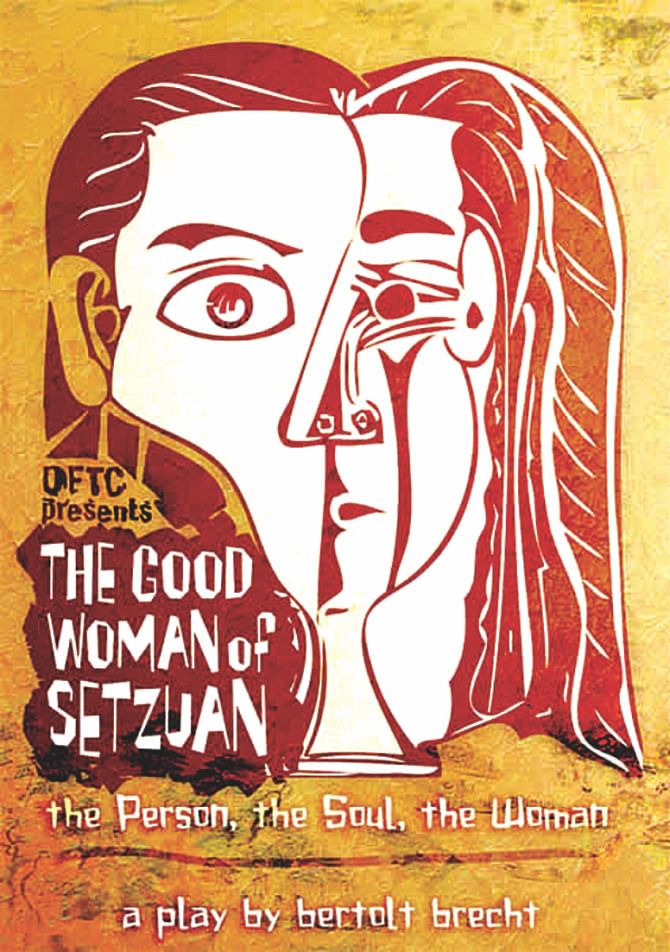Good Woman of Setzuan

Good Woman of Setzuan is a play written in 1938-1940 by Bertolt Brecht, a German playwright and theatre director. The play opens with Wong, a water seller, explaining to the audience that he is on the city outskirts awaiting the arrival of three gods. The gods are out on a mission to seek if there are any good people left in the world. Up till now they have not been successful and all efforts have been futile. Instead they have found only greed, evil, dishonesty, and selfishness. The same turns out to be true in the Chinese city of Setzuan. No one will take them in - no one except the poor young prostitute Shen Te who allows the three gods to stay at her house while providing them necessary shelter and comfort.
Shen Te is rewarded for her hospitality, as the gods take it as a sure sign of goodness. They are extremely happy because they have found a 'good person' and all is not lost. In gratitude, they give her money and she buys a humble tobacco shop which they intend as a gift. But along with that, they also put her to a test. They know Shen Te is good but the test will find out if Shen Te can maintain to be good with these newfound means in the long run. If she succeeds, the gods' confidence in humanity would be restored. Though at first Shen Te seems to live up to the gods' expectations, her generosity allows people to take advantage of her kindness and she gives everything away. At one point, she realises that if she continues the way she is doing she will be back on the streets so she creates an alter ego in the name of Shui Ta, a male cousin. She tells everyone she has to leave and her cousin Shui Ta will run the shop. As a double character, Shen Te wears the costume of male clothing, a mask, and a forceful voice to take on the role of Shui Ta. Shui Ta arrives at the shop, coldly explains that his cousin has gone out of town on a short trip, expels the lazy people who are taking advantage of Shen Te's generosity and through smart business decisions, quickly restores order to the shop and brings it back to profitability. In his efforts to bring the business to profitability, Shui Ta made a lot of enemies because of his hard, unpopular business decisions. This is Brecht's nod to the capitalist who has to make cold, calculated decisions that may not be popular but necessary for business purposes.
Where Shen Te is soft, compassionate, and vulnerable, Shui Ta is unemotional and pragmatic, even vicious. It seems that only Shui Ta is made to survive in the world in which they live. In what seems no time at all, he has built her humble shop into a full-scale tobacco factory with many employees. Here, the question of Who is 'good' arises. Is it the good natured prostitute whose kindness is making people lazy or the cold hearted capitalist who is responsible for generating income and prosperity ?
Eventually, the townspeople suspect Shin Te for murdering Shui Ta and take him to court. During the process of her trial, the gods appear in the robes of the judges, and Shui Ta reveals to the gods, that Shui Ta is actually Shen Te. She explains being good has got her into trouble and therefore she had to create this alter ego to survive. The gods then realise they are confronted by the dilemma that their divine intervention has caused : they have created impossible circumstances for those who wish to live "good" lives; however, when it is time to make a verdict, the gods refuse to intervene directly to protect their followers from the vulnerability that results from this "being good". The gods leave without providing further guidance. This was Brecht's way of saying that God, or gods or even religion was not the answer to society's problems.
At the end, the narrator throws the responsibility of finding a solution to the play's problem onto the shoulders of the audience. It is for the spectator to figure out how a good person can possibly come to a good end in a world that, in essence, is not good. The play relies on the assumption that the spectator will be moved to see that the current structure of society must be changed in order to resolve the problem. That is what Brecht hoped to achieve when writing this play.
Though being a Marxist with socialist leanings, Brecht however does not impose his opinions on the audience he also shares the other side of the story. Shen Te's alter ego, the capitalist minded Shui Ta is the proponent of capitalism; so unlike Shen Te, Shui Ta does not lament the injustice around him and has no problem with capitalism. In most interesting way, Brecht uses dual characters to promote two opposite philosophies. Whereas Brecht uses Shin Te to say capitalism is bad, he uses Shui Ta to say capitalism may be good and necessary. Importantly, he wants the audience to decide what is considered good and what is considered bad. So, in this play, it is seen that Shui Ta accepts and embraces the idea of competition. This generated a hot debate in Brecht's time and it continues to do so today, particularly in developing as well as less developing countries where labour may be exploited for specific industries. But like Shui Ta, many industrialists today may counter that it is because of capitalism that employment has been generated for the masses who would otherwise would have remained unemployed.
Brecht illustrated the difficulty of being good and staying good in any society. Shen Te continues with the line "It has torn me in two" (Brecht 107). This line is perhaps the most poignant line in the entire play. It is symbolic in many aspects. It represents the class struggle between the bourgeois and the working class, the struggles between good and evil, the conflict between man and woman, the mistrust between neighbours, and the list is endless.
Even after 71 years of writing Good Woman of Setzuan, the debate on the definition of goodness still rages on. We are still nowhere near an answer and Bertolt Brecht is enjoying every minute of this, watching us from wherever he is.

 For all latest news, follow The Daily Star's Google News channel.
For all latest news, follow The Daily Star's Google News channel. 



Comments